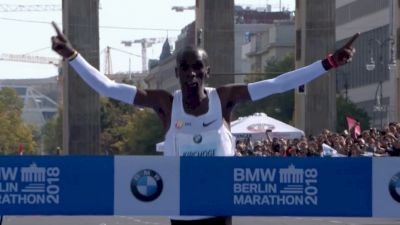Five Takeaways From Eliud Kipchoge's World Record In Berlin
Five Takeaways From Eliud Kipchoge's World Record In Berlin
Five reactions after Eliud Kipchoge's 2:01:39 world record in Berlin.
Those in the running world will not soon forget where they were and what they were doing on September 16, 2018, the day 33-year-old Eliud Kipchoge recalibrated our understanding of the marathon by running 2:01:39 in Berlin.
There are hardly sufficient words to describe just how spectacular Kipchoge’s 78-second improvement on the world record was, but with a day to stew on the ramifications of the performance, here are five takeaways from the greatest men’s marathon in history:
The race didn’t go exactly to plan
The race plan was immediately clear as Kipchoge took off from the start with three pacers working as a shield in front of him, but all three ultimately disappointed in varying degrees.
The first pacer dropped out just past 14k, and another stepped off before 16k, which put incredible pressure on the remaining pacer-- Kenyan Josphat Boit-- to not only shield Kipchoge but to keep him on tempo.
Boit did an admirable job by himself for the next six-ish miles, but by 25k he was toast; that left Kipchoge up to his own devices for the 10-plus miles to the finish. Fortunately, Kipchoge was able to handle the load and he even ran his fastest 10k all alone from 32k to the finish, but the relatively poor pacing suggests that the Kenyan still has room for improvement.
Remember when Kipchoge passed through the first 10km in 29:01 and everyone got excited because he was 30sec inside WR pace?
— Jon Mulkeen (@Statman_Jon) September 16, 2018
That was actually the slowest 10km segment of his race.
His 10km splits:
29:01
28:55
28:49
28:47
His last 10km (from 32.195 to 42.195km) was ~28:33.
Saying that about a 2:01:39 didn’t seem possible before yesterday, but this is the new world we live in.
Kipchoge’s world record is ridiculous, but Paula Radcliffe’s is still better
I initially thought it was silly that as Kipchoge approached the finish line of the greatest men’s marathon performance in history, race announcer Tim Hutchings suggested-- as he tried to put Kipchoge’s heroics in context-- that Paula Radcliffe’s 2:15:25 women's world record from 2003 was still the top marathon performance in history. Here’s what Hutchings said:
“Paula Radcliffe’s mark remains untouched by anybody so far. This is Radcliffe-esque!”
My reaction in the moment: Radcliffe-esque?! How could a 2:01 marathon not be considered the greatest achievement in the event’s history? I thought Hutchings was showing a little favoritism for a fellow Brit until later when I compared the men’s and women’s marathon world records to their respective No. 2 performers. The result?
By the slightest margin, Hutchings was right-- Radcliffe’s record is 1.2-percent faster than Mary Keitany’s 2:17:01 No. 2 all-time mark, while Kipchoge’s 2:01:39 is 1.1-percent better than Dennis Kimetto’s 2:02:57. I doubt this stat was crossing his mind as he uttered the statement yesterday, but by a slim percentage, Hutchings was correct.
What is Dennis Kimetto's legacy?
Given the miserable luck he’s had of late finishing races-- he has DNF’d in five of his last six marathons-- it’s likely that former world record holder Dennis Kimetto will be remembered primarily as the answer to a Kipchoge-related trivia question. But now that Kimetto is no longer atop the record books in the marathon, how will we remember his career?
While it’s technically still possible that he could get back to his 2:02:57 form, not many people outside of Kimetto believe that’s going to happen. But still, let’s not pretend that the Kenyan was just a one-hit wonder; over a two-season span from 2013 to 2014, Kimetto won three of the four major marathons he entered, and in 2012 he debuted with a 2:04:16 in Berlin, which was the second-fastest debut ever at the time.
Congratulations @EliudKipchoge with the new WR! Fantastic run, you’re an example for each and every runner on this world. Pongezi sana @berlinmarathon pic.twitter.com/Jz7u2BUjKx
— Dennis Kimetto (@DennisKimetto) September 16, 2018
Remember: Kimetto got into running incredibly late (he didn’t start racing internationally until he was 27), so any expectation that he would have a long career was clearly ambitious. His dominance was quite short-lived, especially compared to Kipchoge, but Kimetto’s two-year peak from 2012 to 2014 after a quick ascent was truly astonishing.
Kipchoge went out fast in Berlin, but the first half of London 2018 was faster
When Kipchoge rattled off a 61:06 first half on Sunday in Berlin, it seemed like a super-aggressive tempo at the time considering he was running at 2:02:12 marathon pace-- 40 seconds ahead of Kimetto’s record-- but the split wasn’t even his fastest first half in 2018.
If you recall from April, the field in London went out in a crazy-fast 61:00 in 75-degree heat, which even Kipchoge paid the price for as he closed in just 63:17. With much better conditions yesterday, Kipchoge was able to crush the second half in a remarkable 60:33.
Only six Americans have run faster in the half marathon than Kipchoge’s second 13.1
A hat tip goes out to Scott Douglas (@mescottdouglas), who pointed out on Twitter that just four Americans have ever run faster in the half than Eliud Kipchoge’s second 13.1 (60:33) on Sunday. By my count there are actually six men, but still the point is the same. Kipchoge just ran faster in the half marathon-- immediately after running a 61:06 first half -- than all but six American men have done in history.
Here are the six: Ryan Hall (59:43), Galen Rupp (59:47), Leonard Korir (59:52), Dathan Ritzenhein (60:00), Todd Williams (60:11), and Abdi Abdirahman (60:29).
All six of those guys are Olympians!
